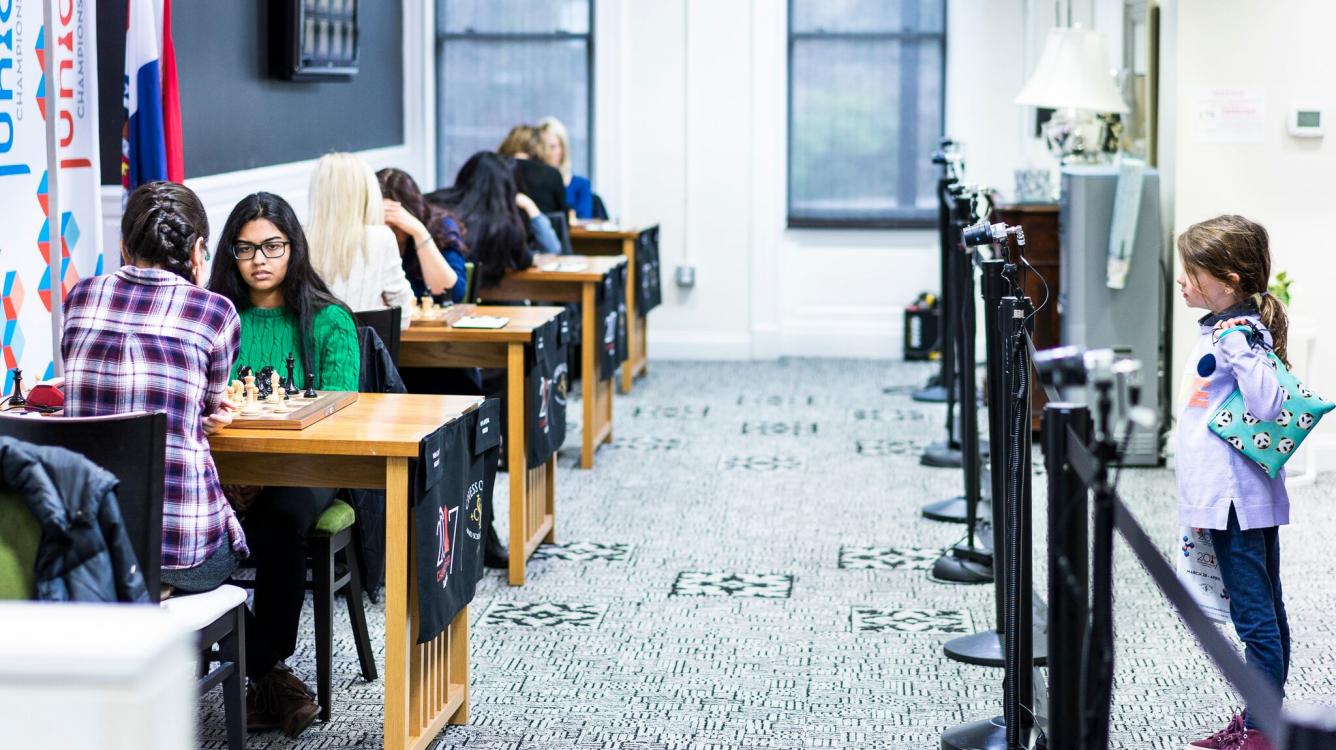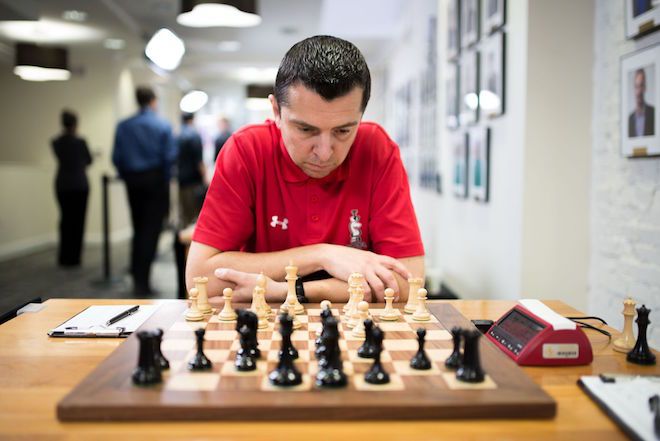
Nakamura, So Among U.S. Champs Leaders
There are no longer easy title defenses in St. Louis. GM Gata Kamsky used to win U.S. championship titles in bunches earlier this decade, but those days are over. Even the Sinquefield Cup, also held in St. Louis, has produced four different winners in its four iterations.
Lead photo courtesy Lennart Ootes for the Chess Club and Scholastic Center of Saint Louis.
The returning U.S. champion, GM Fabiano Caruana, is finding it hard to get things going through three rounds, although he hasn't had any help from the pairings. The opening trio of games has matched him with three of his four Olympiad teammates, so surviving this test perhaps means his even score is deceptive.
While he hasn't been able to notch his first win, five others are on +1 and lead with 2.0/3: GMs Wesley So, Hikaru Nakamura, Alexander Onischuk, Daniel Naroditsky, and Yaroslav Zherebukh.

GM Hikaru Nakamura, standing, won on Wednesday but had to watch to see who could catch up to him in the early going. Photo courtesy Lennart Ootes for the Chess Club and Scholastic Center of Saint Louis.
Back to Caruana. He struggled for equality in an opening-round draw against GM Sam Shankland, then couldn't win as White yesterday against longtime foe Nakamura.
He didn't get any help from the pairings today, as he got Black in round three against top-seeded So. He held the Berlin comfortably, setting up a little bit easier schedule in the latter stages of the championship.

GM Alex Onischuk. Is this the year he becomes a multi-time champion like Kamsky, Nakamura, and Shabalov? Photo courtesy Austin Fuller for the Chess Club and Scholastic Center of Saint Louis.
In addition to that 1-2 matchup, today we also had 3-4. but Nakamura's queenside expansion in the Giuoco Piano didn't return anything significant against GM Jeffery Xiong.
Now let's check on some of the winners in the last two round, and their conversions. The 2700+ club got the job done in round one, as noted in the opening-round report. Today, Naroditsky got his victory over GM Varuzhan Akobian with straightforward play. First create some active pieces, translate that into a positional weakness (doubled pawns), then win the pawn and the endgame.
Surely the Stanford student can explain it with more technical details, so here's a few:
"Especially after I played ...c5 I thought I equalized quite comfortably," Naroditsky said, adding that there were some complications navigating the interconnectedness of Queen's Gambit and Ragozin transpositions, but, "I definitely think I didn't have any problems in the opening."
The loss for Akobian spoils his brief flirtation with the lead. After yesterday's game he had a share of the top of the tables when Kamsky blundered and had to resign immediately. The win enacts a small measure of revenge for the U.S. championship playoff loss Akobian suffered to Kamsky in 2014.
It turns out Kamsky just can't buy a tactical break so far. Today he had the more promising structure, and in addition Robson was taking 7-9 minutes for every middlegame move and getting in his usual time pressure. The youngster then found a quasi-trap of Black's centralized queen, and Kamsky had to give away a clean pawn to clear an escape route.
Robson's technique was adequate, and he transitioned into a winning king-and-pawn ending. After a rogue encounter to start their personal encounters, the two have met exactly once every year since 2010, always at the U.S. championship. This was Robson's first-ever win against Kamsky:
Amazingly, Kamsky's 0.5/3 does not land him in the cellar. Today, the tournament's only newbie, Zherebukh, picked on the other multi-title-holding veteran, GM Alexander Shabalov. The Pittsburgher dropped to 0-3 thus far.
Shabalov has shown so far that he still abhors quick draws, but his fighting chess did not get him any conversions. First, his round-three loss to Zherebukh, who didn't prepare at all after a grueling Thursday that included a "tough" game from a surprise opening and then a three-hour class at St. Louis University.
The final leader, Onischuk, overcame Shabalov a day earlier thanks to some of the strangest tripled pawns you'll ever see. First, Shabalov never captured them, despite the farthest advanced one being easy prey. Then, the c7-pawn overtook the c6-pawn, essentially jumping over it à la Chinese Checkers.
Onischuk's on-again, off-again triplets lasted the entire game (in real life he "only" has twins!), and Shabalov resigned before seeing each and every one of them promote. When they are inexorably coming down the line like that, you can't just eat them like Lucille Ball:
Here are those chocolates, or rather, c-pawns:
In the U.S. women's championship, things are a bit less crowded at the top. GM Irina Krush's productive 48 hours have resulted in two wins and leading all alone at 2.5/3. (No perfect scores in either division means once again club founder Rex Sinquefield can void his $64,000 "Fischer Prize" check.)
First, the seven-time champ wiggled out of a losing ending in round two. The winning technique for her Olympiad teammate wasn't obvious, but we present it here:
Today WGM Tatev Abrahamyan resumed her yearly rivalry with Krush. If you thought Robson-Kamsky went back a ways, the ladies have them beat by a country mile. They've now played 11 straight years in the U.S. women's championship dating back to 2007. In some years, they've contested multiple games through tiebreaks, although Krush commanded an 8-1 edge (with only two draws!) in classical going into today.

The Abrahayam-Krush tussle has now spanned three U.S. presidents. Photo courtesy Austin Fuller for the Chess Club and Scholastic Center of Saint Louis.
In many ways, Abrahamyan is the female version of Akobian, and not just because they are both of the Armenian diaspora. Both are generally regarded as the "closest to winning" a title, as both have several second-place finishes on their scorecards. Both are also devout French players. But while Akobian has added the Caro-Kann to his arsenal, today Krush used it against Abrahamyan.
Another important game for the standings occurred today between defending champion IM Nazi Paikidze and IM Anna Zatonskih. In round one, the oldest player in the event said the fatigue of a 5+ hour game let her down late. Today, she won the longest game of the round, by the narrowest margin. She again allowed a tactic deep in the game, which should have cost her a half-point.
"She deserved to draw," Zatonskih said.
One of the reasons it went so long was the extreme labor Zatonskih spent in the opening, causing her to go way down on time. Then, she mistakenly allowed Paikidze to sacrifice for her connected passers.
"Don't give me a hard time! My coach will ask me the same questions!" Zatonskih said when asked about her time management.

OK, now analyze all 129 moves for the audience Anna! Photo courtesy Lennart Ootes for the Chess Club and Scholastic Center of Saint Louis.
Amazingly, Paikidze had played 48 moves and survived the theoretically-drawn ending, but any 49th move led to mate! Talk about going down to the final move. She admitted afterward she'd lost the same ending before.
"This is absolutely shocking beyond belief," commentator GM Maurice Ashley said. (And full credit to the on-air team for staying with it until the end, otherwise the moment would not be caught on video.)
"I'm not sure it was fun. It was tough," GM Yasser Seirawan said after the final move had been made, adding it was "traumatic" and "dramatic" to see Zatonskih essentially have to win the game three times.
Chasing Krush's 2.5/3 are Zatonskih, WGM Sabina Foisor (who rebounded today to win), and future engineer WFM Apurva Virkud, who "only" practices one hour per day but is still keeping up with the professionals in the field.
Here's the full standings:


Luckily for Caruana, he plays 2700s and 2800s all the time. The pairings gods do not let up tomorrow. Already having played seeds one and three, tomorrow he get four (Xiong). Since he can't play himself, it's all downhill from here!


All images courtesy Spectrum Studios.
You can catch the full broadcast at 11am Pacific, 2pm Eastern at either at Chess.com/TV or at the official site, uschesschamps.com.
Previous reports:


